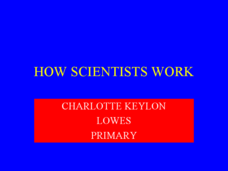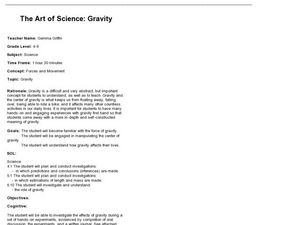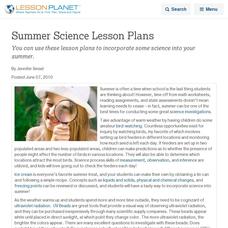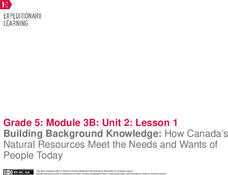It's About Time
Inferences of Waves
Building on the previous lesson, scholars use Slinkies to create standing waves. They graph waves on a calculator and then apply their knowledge to both sound and light waves. This is the fourth in a series of nine lessons.
Curated OER
How Scientists Work
The arsenal of tools a scientist uses to observe the world are varied. This great presentation gives students a look at some of the strategies they should use when looking at the world around them. The information can be used as a...
Curated OER
Inference By Analogy
Learners infer the use or meaning of items recovered from a North Carolina Native American site based on 17th-century European settlers' accounts and illustration.
National Wildlife Federation
Get Your Techno On
Desert regions are hotter for multiple reasons; the lack of vegetation causes the sun's heat to go straight into the surface and the lack of moisture means none of the heat is being transferred into evaporation. This concept, and other...
Curated OER
Ornithology and Real World Science
Double click that mouse because you just found an amazing lesson! This cross-curricular Ornithology lesson incorporates literature, writing, reading informational text, data collection, scientific inquiry, Internet research, art, and...
Curated OER
Discovering Language Arts-Intermediate Fiction
Explore the elements of science fiction. Students investigate the literary elements present in science fiction and write their own science fiction stories.
Curated OER
Data Analysis
Young statisticians use and interpret measures of center and spread such as mean, median, and mode as well as range. They use box plots to represent their data and answer questions regarding the correspondence between data sets and the...
Howard Hughes Medical Institute
Human Feet Are Strange
Feet are neat! So, if you've already walked the path of examining animal footprints with your class, put them in the shoes of early humans! A well-designed lesson incorporates video, discussion, and hands-on learning to demonstrate how...
It's About Time
Mass Extinction and Fossil Records
The focus of a fossil-based lesson uses graphs and charts that allow young paleontologists to make inferences about events of mass extinction. They must apply their previous knowledge about fossil records in this final lesson of the...
NOAA
Biological Oceanographic Investigations – Keep Away
As of 2015, there are 53,481 oil wells in the Gulf of Mexico. Scholars determine how species diversity is impacted based on the ecosystem's distance from a drilling platform. It focuses on finding the mean of data sets and creating bar...
Curated OER
What Is the Nature of Science?
Students distinguish between scientific and everyday meanings of key words-theory, hypothesis, law, fact-and use in context. They recognize the variables that affect observation, data collection, and interpretation. They discover the...
Noyce Foundation
Ducklings
The class gets their mean and median all in a row with an assessment task that uses a population of ducklings to work with data displays and measures of central tendency. Pupils create a frequency chart and calculate the mean and median....
Curated OER
Making Regolith
You may not be able to take a field trip to the moon, but that doesn't mean your class can't study moon rocks. Using graham crackers as the moon's bedrock and powdered donuts as micrometeorites, young scientists simulate the creation of...
Curated OER
Science TV: Making it Real
Students explore the ways science is presented in a children's television show. Students conduct internet research, and then create and design a skit that highlights the problem-solving process.
Curated OER
The Art of Science: Gravity
Through a series of experiments and demonstrations, fifth graders will learn about gravity. They will make predictions, drop various objects, write down their observations, and try to understand gravity through balance. This lesson seems...
Curated OER
Summer Science Lesson Plans
You can use these lesson plans to incorporate some science into your summer.
Curated OER
A Discourse on the History of Language
Analyze and make inferences from the information used by linguists to construct the evolution of languages. They research different dating techniques to explain how scientists infer age with evidence.
Curated OER
Keep Away
Study biological diversity by analyzing given data, and make inferences about the possible effects of oil drilling operations on specific benthic communities. This activity allows students to use their statistical analysis skills asweel...
Curated OER
A Hilly Ride
Different types of energy are the focus of this science resource. Learners identify situations in which kinetic and potential energy are exchanged. They conduct an in-class inquiry which leads them to discover that there is a limit to...
Curated OER
Motel of Mysteries
Students determine that even though inferences are based on observations that does not mean they are always true or correct. They pull the topics and main ideas out of a piece of difficult text.
American Statistical Association
More Confidence in Salaries in Petroleum Engineering
Making inferences isn't an exact science. Using data about salaries, learners investigate the accuracy of their inferences. Their analyses includes simulations and randomization tests as well as population means.
Curated OER
Activity #4 What Do Equations Mean?
Students practice with writing and balancing simple chemcial equations. they comprehend that chemical equations are a method of using a set of univeral symbols to represent what happens experimentally in chemical reactions. Pupils...
EngageNY
Building Background Knowledge: How Canada’s Natural Resources Meet the Needs and Wants of People Today
Learners follow along as the teacher reads Products of Mining in Canada: From Batteries to Vehicles aloud. They then discuss the meaning of key terms and determine the gist of the text. Pupils do a second read and complete a graphic...
Colorado State University
If You Can't Predict the Weather, How Can You Predict the Climate?
Why is the weather man wrong so often? Young climatologists discover how chaos rules both weather and climate through a math-based activity. Using an iterative equation, the class examines how small day-to-day weather events total up to...

























